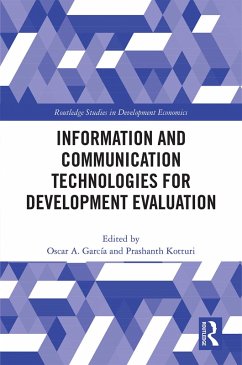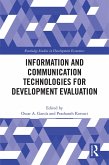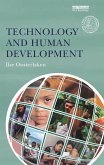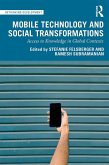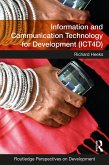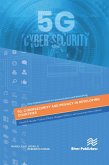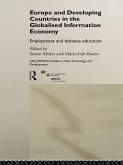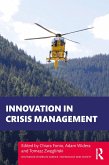Information and Communication Technologies for Development Evaluation (eBook, ePUB)
World Bank Series on Evaluation and Development, Volume 10
Redaktion: García, Oscar A.; Kotturi, Prashanth
44,95 €
44,95 €
inkl. MwSt.
Sofort per Download lieferbar

22 °P sammeln
44,95 €
Als Download kaufen

44,95 €
inkl. MwSt.
Sofort per Download lieferbar

22 °P sammeln
Jetzt verschenken
Alle Infos zum eBook verschenken
44,95 €
inkl. MwSt.
Sofort per Download lieferbar
Alle Infos zum eBook verschenken

22 °P sammeln
Information and Communication Technologies for Development Evaluation (eBook, ePUB)
World Bank Series on Evaluation and Development, Volume 10
Redaktion: García, Oscar A.; Kotturi, Prashanth
- Format: ePub
- Merkliste
- Auf die Merkliste
- Bewerten Bewerten
- Teilen
- Produkt teilen
- Produkterinnerung
- Produkterinnerung

Bitte loggen Sie sich zunächst in Ihr Kundenkonto ein oder registrieren Sie sich bei
bücher.de, um das eBook-Abo tolino select nutzen zu können.
Hier können Sie sich einloggen
Hier können Sie sich einloggen
Sie sind bereits eingeloggt. Klicken Sie auf 2. tolino select Abo, um fortzufahren.

Bitte loggen Sie sich zunächst in Ihr Kundenkonto ein oder registrieren Sie sich bei bücher.de, um das eBook-Abo tolino select nutzen zu können.
Written by a team of expert practitioners at the Independent Office of Evaluation of IFAD, this book gives an insight into the implications of new and emerging technologies in development evaluation.
- Geräte: eReader
- mit Kopierschutz
- eBook Hilfe
Andere Kunden interessierten sich auch für
![Information and Communication Technologies for Development Evaluation (eBook, PDF) Information and Communication Technologies for Development Evaluation (eBook, PDF)]() Information and Communication Technologies for Development Evaluation (eBook, PDF)44,95 €
Information and Communication Technologies for Development Evaluation (eBook, PDF)44,95 €![Technology and Human Development (eBook, ePUB) Technology and Human Development (eBook, ePUB)]() Ilse OosterlakenTechnology and Human Development (eBook, ePUB)46,95 €
Ilse OosterlakenTechnology and Human Development (eBook, ePUB)46,95 €![Mobile Technology and Social Transformations (eBook, ePUB) Mobile Technology and Social Transformations (eBook, ePUB)]() Mobile Technology and Social Transformations (eBook, ePUB)39,95 €
Mobile Technology and Social Transformations (eBook, ePUB)39,95 €![Information and Communication Technology for Development (ICT4D) (eBook, ePUB) Information and Communication Technology for Development (ICT4D) (eBook, ePUB)]() Richard HeeksInformation and Communication Technology for Development (ICT4D) (eBook, ePUB)42,95 €
Richard HeeksInformation and Communication Technology for Development (ICT4D) (eBook, ePUB)42,95 €![5G, Cybersecurity and Privacy in Developing Countries (eBook, ePUB) 5G, Cybersecurity and Privacy in Developing Countries (eBook, ePUB)]() 5G, Cybersecurity and Privacy in Developing Countries (eBook, ePUB)110,95 €
5G, Cybersecurity and Privacy in Developing Countries (eBook, ePUB)110,95 €![Europe and Developing Countries in the Globalized Information Economy (eBook, ePUB) Europe and Developing Countries in the Globalized Information Economy (eBook, ePUB)]() Europe and Developing Countries in the Globalized Information Economy (eBook, ePUB)45,95 €
Europe and Developing Countries in the Globalized Information Economy (eBook, ePUB)45,95 €![Innovation in Crisis Management (eBook, ePUB) Innovation in Crisis Management (eBook, ePUB)]() Innovation in Crisis Management (eBook, ePUB)37,95 €
Innovation in Crisis Management (eBook, ePUB)37,95 €-
-
-
Written by a team of expert practitioners at the Independent Office of Evaluation of IFAD, this book gives an insight into the implications of new and emerging technologies in development evaluation.
Dieser Download kann aus rechtlichen Gründen nur mit Rechnungsadresse in A, B, BG, CY, CZ, D, DK, EW, E, FIN, F, GR, HR, H, IRL, I, LT, L, LR, M, NL, PL, P, R, S, SLO, SK ausgeliefert werden.
Produktdetails
- Produktdetails
- Verlag: Taylor & Francis eBooks
- Seitenzahl: 172
- Erscheinungstermin: 9. Juli 2019
- Englisch
- ISBN-13: 9780429647901
- Artikelnr.: 57101771
- Verlag: Taylor & Francis eBooks
- Seitenzahl: 172
- Erscheinungstermin: 9. Juli 2019
- Englisch
- ISBN-13: 9780429647901
- Artikelnr.: 57101771
- Herstellerkennzeichnung Die Herstellerinformationen sind derzeit nicht verfügbar.
Oscar A. García is the Director of the Independent Office of Evaluation (IOE) of the International Fund for Agricultural Development (IFAD). Before joining IFAD, Oscar served as the head of the advisory services at UNEP - Technology, Industry and Economics Division, Paris, providing guidance to the Partnership for Action on Green Economy. He was senior evaluation advisor for the United Nations Development Programme UNDP Evaluation Office overseeing programmatic evaluations in Africa, Asia and Latin America and the Caribbean. Mr. Garcia has more than 25 years of professional experience, combining operational and managerial practice with results-based management, strategic planning and evaluation expertise. Prashanth Kotturi joined the IOE in October 2012 and is currently working as an Evaluation Analyst. Since then, he has worked in lead and support roles on a wide range of evaluations ranging from project evaluations, country portfolio evaluations to corporate-level evaluations and evaluation synthesis. Before IOE, Prashanth has worked in the financial services industry and with microfinance institutions in his home country, India.
1 Introductions Oscar A. García and Prashanth Kotturi
2 Evaluation and the Sustainable Development Goals: Opportunities and
Constraints Marco Segone
3 Information and Communication Technologies for Evaluation (ICT4Eval):
Theory and Practice Oscar A. García, Jyrki Pulkkinenand and Prashanth
Kotturi
A Data collection: Faster, cheaper, more accurate
B Data analysis: The machine learning revolution
C Dissemination and learning: Reaching a global audience
D Case studies: Geospatial analysis in environmental evaluation Juha Ilari
Uitto, Anupam Anand and Geeta Batra; Simulated field visits in fragile and
conflict environments: Reaching the most insecure areas of Somalia
virtually Monica Zikusooka; Analysing stories of change: engaging
beneficiaries to make sense of data Michael Carbon and Hamdi Ahmedou; Is
there a role for machine learning in the systematic review of evidence?
Edoardo Masset; Using machine learning to improve impact evaluations Paul
Jasper; Using geospatial data to produce fine-scale humanitarian maps
Gaurav Singhal, Lorenzo Riches and Jean-Baptiste Pasquier; Using and
sharing real-time data during fieldwork Simone Lombardini and Emily Tomkys
E ICTs in practice - the case for cautious optimism
F Evaluation 2.0; turning dilemmas to dividends?
4 Big data analytics and development evaluation: Optimism and caution,
Michael Bamberger
A Some themes from the big data literature
B Demystifying big data
C Where is the big data revolution headed?
D Does big data apply to development evaluation? Should evaluators care
about it?
E The great potential for integrating big data into development evaluation
F Big data and development evaluation: the need for caution
G Overcoming barriers to big data use in evaluation
5 Technology, Biases and Ethics: Exploring the Soft Sides of Information
and Communication Technologies for Evaluation (ICT4Eval), Linda Raftree
A Factors affecting information technology access and use among the most
vulnerable
B Data and technology alone cannot ensure inclusion
C Inclusiveness of access and use affect the representativeness of big data
D Bias in big data, artificial intelligence and machine learning
E Protecting data subjects' rights in tech-enabled, data-led exercises
F Improving data privacy and protection in the development sector
6 Technology and its implications for nations and development partners
Oscar A. García and Prashanth Kotturi
A Structural transition and pathways for economic development
B Who has technology affected the most?
C A Luddite's nightmare or a passing phenomenon?
D Implications for sustainable rural development
E Dealing with disruptions and moving forward
F Implications for development partners
7 Conclusions Oscar A. García and Prashanth Kotturi
2 Evaluation and the Sustainable Development Goals: Opportunities and
Constraints Marco Segone
3 Information and Communication Technologies for Evaluation (ICT4Eval):
Theory and Practice Oscar A. García, Jyrki Pulkkinenand and Prashanth
Kotturi
A Data collection: Faster, cheaper, more accurate
B Data analysis: The machine learning revolution
C Dissemination and learning: Reaching a global audience
D Case studies: Geospatial analysis in environmental evaluation Juha Ilari
Uitto, Anupam Anand and Geeta Batra; Simulated field visits in fragile and
conflict environments: Reaching the most insecure areas of Somalia
virtually Monica Zikusooka; Analysing stories of change: engaging
beneficiaries to make sense of data Michael Carbon and Hamdi Ahmedou; Is
there a role for machine learning in the systematic review of evidence?
Edoardo Masset; Using machine learning to improve impact evaluations Paul
Jasper; Using geospatial data to produce fine-scale humanitarian maps
Gaurav Singhal, Lorenzo Riches and Jean-Baptiste Pasquier; Using and
sharing real-time data during fieldwork Simone Lombardini and Emily Tomkys
E ICTs in practice - the case for cautious optimism
F Evaluation 2.0; turning dilemmas to dividends?
4 Big data analytics and development evaluation: Optimism and caution,
Michael Bamberger
A Some themes from the big data literature
B Demystifying big data
C Where is the big data revolution headed?
D Does big data apply to development evaluation? Should evaluators care
about it?
E The great potential for integrating big data into development evaluation
F Big data and development evaluation: the need for caution
G Overcoming barriers to big data use in evaluation
5 Technology, Biases and Ethics: Exploring the Soft Sides of Information
and Communication Technologies for Evaluation (ICT4Eval), Linda Raftree
A Factors affecting information technology access and use among the most
vulnerable
B Data and technology alone cannot ensure inclusion
C Inclusiveness of access and use affect the representativeness of big data
D Bias in big data, artificial intelligence and machine learning
E Protecting data subjects' rights in tech-enabled, data-led exercises
F Improving data privacy and protection in the development sector
6 Technology and its implications for nations and development partners
Oscar A. García and Prashanth Kotturi
A Structural transition and pathways for economic development
B Who has technology affected the most?
C A Luddite's nightmare or a passing phenomenon?
D Implications for sustainable rural development
E Dealing with disruptions and moving forward
F Implications for development partners
7 Conclusions Oscar A. García and Prashanth Kotturi
1 Introductions Oscar A. García and Prashanth Kotturi
2 Evaluation and the Sustainable Development Goals: Opportunities and
Constraints Marco Segone
3 Information and Communication Technologies for Evaluation (ICT4Eval):
Theory and Practice Oscar A. García, Jyrki Pulkkinenand and Prashanth
Kotturi
A Data collection: Faster, cheaper, more accurate
B Data analysis: The machine learning revolution
C Dissemination and learning: Reaching a global audience
D Case studies: Geospatial analysis in environmental evaluation Juha Ilari
Uitto, Anupam Anand and Geeta Batra; Simulated field visits in fragile and
conflict environments: Reaching the most insecure areas of Somalia
virtually Monica Zikusooka; Analysing stories of change: engaging
beneficiaries to make sense of data Michael Carbon and Hamdi Ahmedou; Is
there a role for machine learning in the systematic review of evidence?
Edoardo Masset; Using machine learning to improve impact evaluations Paul
Jasper; Using geospatial data to produce fine-scale humanitarian maps
Gaurav Singhal, Lorenzo Riches and Jean-Baptiste Pasquier; Using and
sharing real-time data during fieldwork Simone Lombardini and Emily Tomkys
E ICTs in practice - the case for cautious optimism
F Evaluation 2.0; turning dilemmas to dividends?
4 Big data analytics and development evaluation: Optimism and caution,
Michael Bamberger
A Some themes from the big data literature
B Demystifying big data
C Where is the big data revolution headed?
D Does big data apply to development evaluation? Should evaluators care
about it?
E The great potential for integrating big data into development evaluation
F Big data and development evaluation: the need for caution
G Overcoming barriers to big data use in evaluation
5 Technology, Biases and Ethics: Exploring the Soft Sides of Information
and Communication Technologies for Evaluation (ICT4Eval), Linda Raftree
A Factors affecting information technology access and use among the most
vulnerable
B Data and technology alone cannot ensure inclusion
C Inclusiveness of access and use affect the representativeness of big data
D Bias in big data, artificial intelligence and machine learning
E Protecting data subjects' rights in tech-enabled, data-led exercises
F Improving data privacy and protection in the development sector
6 Technology and its implications for nations and development partners
Oscar A. García and Prashanth Kotturi
A Structural transition and pathways for economic development
B Who has technology affected the most?
C A Luddite's nightmare or a passing phenomenon?
D Implications for sustainable rural development
E Dealing with disruptions and moving forward
F Implications for development partners
7 Conclusions Oscar A. García and Prashanth Kotturi
2 Evaluation and the Sustainable Development Goals: Opportunities and
Constraints Marco Segone
3 Information and Communication Technologies for Evaluation (ICT4Eval):
Theory and Practice Oscar A. García, Jyrki Pulkkinenand and Prashanth
Kotturi
A Data collection: Faster, cheaper, more accurate
B Data analysis: The machine learning revolution
C Dissemination and learning: Reaching a global audience
D Case studies: Geospatial analysis in environmental evaluation Juha Ilari
Uitto, Anupam Anand and Geeta Batra; Simulated field visits in fragile and
conflict environments: Reaching the most insecure areas of Somalia
virtually Monica Zikusooka; Analysing stories of change: engaging
beneficiaries to make sense of data Michael Carbon and Hamdi Ahmedou; Is
there a role for machine learning in the systematic review of evidence?
Edoardo Masset; Using machine learning to improve impact evaluations Paul
Jasper; Using geospatial data to produce fine-scale humanitarian maps
Gaurav Singhal, Lorenzo Riches and Jean-Baptiste Pasquier; Using and
sharing real-time data during fieldwork Simone Lombardini and Emily Tomkys
E ICTs in practice - the case for cautious optimism
F Evaluation 2.0; turning dilemmas to dividends?
4 Big data analytics and development evaluation: Optimism and caution,
Michael Bamberger
A Some themes from the big data literature
B Demystifying big data
C Where is the big data revolution headed?
D Does big data apply to development evaluation? Should evaluators care
about it?
E The great potential for integrating big data into development evaluation
F Big data and development evaluation: the need for caution
G Overcoming barriers to big data use in evaluation
5 Technology, Biases and Ethics: Exploring the Soft Sides of Information
and Communication Technologies for Evaluation (ICT4Eval), Linda Raftree
A Factors affecting information technology access and use among the most
vulnerable
B Data and technology alone cannot ensure inclusion
C Inclusiveness of access and use affect the representativeness of big data
D Bias in big data, artificial intelligence and machine learning
E Protecting data subjects' rights in tech-enabled, data-led exercises
F Improving data privacy and protection in the development sector
6 Technology and its implications for nations and development partners
Oscar A. García and Prashanth Kotturi
A Structural transition and pathways for economic development
B Who has technology affected the most?
C A Luddite's nightmare or a passing phenomenon?
D Implications for sustainable rural development
E Dealing with disruptions and moving forward
F Implications for development partners
7 Conclusions Oscar A. García and Prashanth Kotturi
